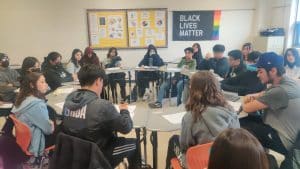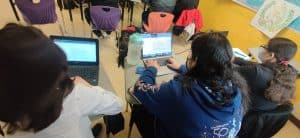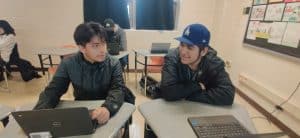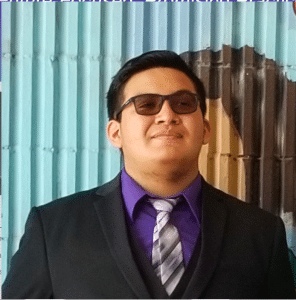From Memorizing for Tests to Learning for Life
CompetencyWorks Blog
We are delighted to publish our first student-authored blog post on CompetencyWorks!
Transitioning to a CBE School
Changing schools is hard enough as it is, but changing how you learn is another ball game. This was my reality in 2021 when I started going to a high school in the Pilsen, Chicago neighborhood named Benito Juarez Community Academy. Choosing this school was a big deal for me because It was my dream school. I was excited to attend because of the later start time and because of the International Baccalaureate program, or IB for short. IB is a program where you can take harder courses and if you continue it to your senior year you can have a chance of getting college credits and getting a feel for college life.
When it was time to finally step foot on campus I had a lot of people ask me if I was worried about this new experience of going to this high school. My answer was no. I was not worried because I love new environments, getting to know people, and embracing something new. Sure, it might take a while to get used to it, but I love it. I love getting out of my comfort zone so I wasn’t that worried about switching schools.
At first, it was like any other school. I didn’t see many changes, other than the big and obvious ones like a new building, new staff members, new people, new rules, and a new environment. There was a lot I had yet to learn and experience, but I was ready for it. It was like nothing I have seen or felt before, but that didn’t phase me. I was up for the challenge and was not willing to let fear get in the way.
A New Way of Learning

I started talking to new people who soon became my friends. I joined clubs and got involved with my school, joining the school’s soccer team and later in the year the school volleyball team. The first week went by really fast, giving me a little taste of what high school was like. The second week is when I got a good, heavy dose of the work and homework I would end up doing during the year. When my history teacher gave us our first “formative” to work on, I didn’t even know what that meant. One thing I have learned from the past is “if you don’t understand something, ask for help even if it is something simple. It is worth asking and getting right, rather than not asking and getting it wrong.” So I asked my history teacher, “Mr.Pickens, what is a formative assessment? I never heard of that nor had one at my old school.” Mr. Pickens answered, “Jose, that’s a good question. Here at Juarez, we don’t do midterms or finals. Since we are a competency-based learning school, we focus on growing and really understanding the material. ‘Formatives’ are the way we can focus on one of the competencies and start the learning process which will lead to your summative assessment where you put everything you learned together.”
I started working on assignments and I felt like I could comprehend the lesson more. The work I turned in showed that I was understanding what I was learning in class. I was understanding the material because the formative made me apply what I’m learning to the work that I was turning in. Unlike standard learning, we never got sat down and quizzed on it. Rather they made us write about a topic, get feedback on it, and work on it with the feedback. What that did was reinforced everything. And with that reinforcement, everything stuck with us. Even to this day, I’m still using what I learned in that class and I remember clearly everything from that class. This would have never happened in standard learning because I was just memorizing it for that day and everything would go out the window. At the time we were learning about native tribes and the land they used to own. Doing formatives helps us to understand what we are learning better. I felt like I could explain it to someone else and have a whole conversation about it.
The formatives were simple but effective to get the main points across. Some examples of formatives that we did in that class were researching the history of the native tribes and the different events that led British colonists to take the land from the natives and make them into national parks, and learning to write formal letters. Another formative we did in history class was a writer’s workshop. In the writer’s workshop, we worked on our writing skills and getting them up to par with college-level writing or close to that. Because our summative was going to be sent to a very important person and we didn’t want our writing to look like a middle schooler’s work, we wanted it to make the person receiving the letter feel like he was receiving it from a very very important person. So we did writing and got feedback and wrote more with more feedback. Towards the end, I – and almost all the class – became very good writers where we can say what we want to say in fewer words than it usually would take us to do.
The formatives prepared us for our summative assessment, which was writing and sending a letter to convince the President to give national parks back to native tribes. We used a lot of persuasive skills that we learned in the writer’s workshop to convince the President to give the land back to the native tribes because native tribes would take care of them better, they’re used to that land, and it was a way to say the USA was sorry for earlier Americans taking that land. This letter was one of my best writings at the time and it helped me build my writing skills, persuasive skills, and overall understanding of history.
Grading System

The way we got graded was different from standard learning where you get your As, Bs, Cs, Ds, and Fs. Instead, we got graded on a number-based scale. Each of those numbers represented a place where we are in our learning. Ones and twos mean that you’re just barely comprehending the information. Threes and fours mean you understand it but only to a certain degree. Three and four are passing grades so if you’re there it’s not like you’re failing, but you would want to bring them up if something is easy because we work on these competencies every single time we do a formative or summative. Fives and sixes mean you understand the material in challenging ways and familiar situations. The best grade you can get is a seven or eight. What seven or eight means is that you understand the material and challenging problems, in familiar and unfamiliar situations. Our grading scale allows us to grow and build our way up toward a seven or eight. I ended that unit with 8s and 7s and maybe one 6.
There are many things that I learned in Competency-Based Learning that I would not have learned in standard learning because in standard learning it never felt like I was really learning. Before it felt like I was just memorizing things that I would end up forgetting later on in life, but in CBE (Competency-Based Learning) I am retaining the information and really understanding it. The formative and summative assessments I describe above happened three years ago and I still remember them. I would never go back to standard learning – not because I hate it but because it just is not my way of learning.

One last part of CBE that I want to talk about is the Developmental Competencies. The Developmental Competencies are five different competencies than the ones we get graded on. These competencies are skills that help us become a better version of ourselves but also practice the skills for future use when we graduate high school. The developmental competencies that we practice and learn every day without knowing are Self-Awareness, Self-Management, Perseverance, Relationships Skills, and Social Awareness.
We practice these Developmental competencies every day. When you are in a classroom you build on your relationships through your Relationships Skills. Sometimes, you have a lot of things going on in your life and the work gets hard, but you still get it done. That is practicing Perseverance. Knowing what you have to work on in your academic life or your everyday self like cutting bad friends off, having to study in a different way, or just knowing what you are not so good at and what you are best at is practicing Self-Awareness and Self-Management. Knowing how to act around people like adults, classmates, and friends is Social Awareness.
Pros and Cons of CBE
Now, I wouldn’t say CBE is perfect by any means. It does have some downsides but the benefits of it outweigh the challenges. Once you get used to it, you will never want to go back to standard learning.
Two things that I especially enjoy about CBE learning:
- Multiple opportunities to bring your grade up – You can always bring your grade up even if a quarter has ended. Learning does not restart nor does it end. Which means you always have opportunities to keep or bring your grade up. This also means students can learn at their own pace.
- No midterms or finals – You never have to worry about remembering everything for a big test that is worth too much of your time and grade. Instead, you do formative and summative assessments that help you learn and grow, and do not stress you out.
One big thing that is challenging for me in CBE:
- Not having stricter deadlines – I’m not saying that you can turn in work that’s a month late, but CBE does not have traditional deadlines. It’s good in some cases, but some students take advantage of that and turn in work late, which could affect them in college because they are harder on deadlines. I’m not saying that everyone does this, but I feel like there should be a system for that such as points off, just to make sure that students don’t take advantage of it.
Video of CBE in Action
Learn More
- CBE Starter Pack 7: Establish Rigorous, Common Expectations with Meaningful Competencies
- The Power of Grades
- Moving Toward Mastery: Growing, Developing and Sustaining Educators for Competency-Based Education
 Jose Guzman Jr. lives in Chicago, Illinois in a small community in Pilsen. He goes to Benito Juarez high school. Jose is a student-athlete at Juarez. He plays volleyball as a setter for his team. Jose also helps out his school’s soccer team as their equipment manager. Jose is also a member of the Student Voice Committee and was a member of the Local Student Council. When outside of school, he enjoys bike riding and playing sports like basketball, soccer, baseball, volleyball, or football. Jose grew up in Mexican culture. All of his family is from Mexico and even though they are far away from their home country, his family still does some if not all of their Mexican traditions. Jose’s goal in life is to start a business and grow it, do a bit of real estate to become wealthy and successful, take care of his family, and help his own future family to have a good future and also become successful in their way.
Jose Guzman Jr. lives in Chicago, Illinois in a small community in Pilsen. He goes to Benito Juarez high school. Jose is a student-athlete at Juarez. He plays volleyball as a setter for his team. Jose also helps out his school’s soccer team as their equipment manager. Jose is also a member of the Student Voice Committee and was a member of the Local Student Council. When outside of school, he enjoys bike riding and playing sports like basketball, soccer, baseball, volleyball, or football. Jose grew up in Mexican culture. All of his family is from Mexico and even though they are far away from their home country, his family still does some if not all of their Mexican traditions. Jose’s goal in life is to start a business and grow it, do a bit of real estate to become wealthy and successful, take care of his family, and help his own future family to have a good future and also become successful in their way.